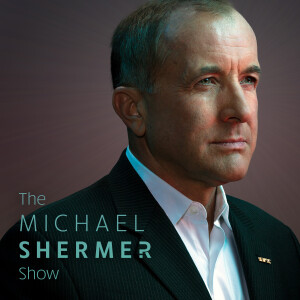
337. On the Origin of Time — Thomas Hertog on Stephen Hawking’s Final Theory
 2023-04-01
2023-04-01
Perhaps the biggest question Stephen Hawking tried to answer in his extraordinary life was how the universe could have created conditions so perfectly hospitable to life. In order to solve this mystery, Hawking studied the Big Bang origin of the universe, but his early work ran into a crisis when the math predicted many big bangs producing a multiverse — countless different universes, most of which would be far too bizarre to harbor life. Holed up in the theoretical physics department at Cambridge, Stephen Hawking and his friend and collaborator Thomas Hertog worked on this problem for twenty years, developing a new theory of the cosmos that could account for the emergence of life.
Shermer and Hertog discuss: what it was like working with Stephen Hawking • Darwinian model of cosmology • time • What banged the Big Bang? • cosmic inflation and multiple universes • how to reconcile Einstein’s relativity theory of gravity and quantum theory • Hawking’s no-boundary theory • why the universe appears designed • Feynman’s sum over histories approach to quantum physics • Is there purpose in the cosmos? • Why is there something rather than nothing?
Thomas Hertog is an internationally renowned cosmologist who was for many years a close collaborator of the late Stephen Hawking. He received his doctorate from the University of Cambridge and is currently professor of theoretical physics at the University of Leuven, where he studies the quantum nature of the Big Bang. He lives with his wife and their four children in Bousval, Belgium.
More Episodes
Create your
podcast in
minutes
- Full-featured podcast site
- Unlimited storage and bandwidth
- Comprehensive podcast stats
- Distribute to Apple Podcasts, Spotify, and more
- Make money with your podcast
It is Free
- Privacy Policy
- Cookie Policy
- Terms of Use
- Consent Preferences
- Copyright © 2015-2024 Podbean.com





